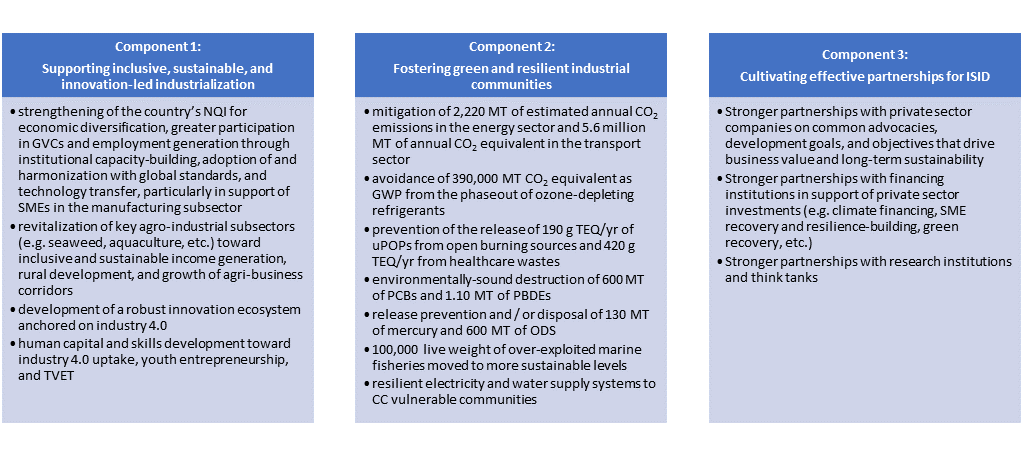Representative(s):
Mr. Teddy G. Monroy
Email:
Telephone:
Tel: +63 2 89022566; +63 9175611448; HQ: 18165; IP: +43 1 26026 18165/18065
The UNIDO Country Office in the Philippines was established on 26 February 1993 by virtue of the Basic Cooperation Agreement between the Government of the Philippines and UNIDO.
Several technical cooperation projects comprise UNIDO's operations in the country, as embodied in the UNIDO Country Programming Framework (UNIDO-CPF) in the Philippines, 2018 – 2023. The current CPF was designed to enhance UNIDO's support to the country in implementing a roadmap towards Inclusive and Sustainable Industrial Development (ISID) as stated in the Lima Declaration adopted on 02 December 2013 during the 15th session of General Conference of UNIDO. In doing this, UNIDO has aligned the organization’s priorities for the Philippines to the Philippine Development Plan (PDP) 2017 - 2022, building on the achievements of past projects and programmes.
For the duration of the CPF, UNIDO’s interventions at the country level will focus on three mutually-reinforcing components:
Incorporating crosscutting themes around developing infrastructure, policy and institutional capacity, human capital, and gender, around UNIDO’s strategic interventions will complete the building blocks for promoting ISID as embedded in SDG 9: Industry, Innovation, and Infrastructure. COVID-19 action plans and other sectoral plans prepared by partner government agencies as well as UNIDO’s COVID-19 and green recovery agenda, have also been take into account.
The CPF has a total value of USD 188M, 21% from grants and 79% from co-financing and investments. The expected benefits from CPF implementation include, but are not limited to the following:

UNIDO’s work under these components will likewise contribute to the joint results contained in the Socio-economic and Peace-building Framework, 2020 – 2023, spearheaded by the government and the United Nations Country Team in the Philippines.
The global COVID-19 outbreak is putting an immense strain on societies and economies around the world, with many nations experiencing a tragic toll in terms of human suffering and casualties. In the Philippines, severe pressure is placed upon national healthcare systems that are unprepared to face a health crisis at this scale and magnitude, facing shortages of facilities, manpower, medical equipment and supplies of personal protective equipment (PPE), and challenges with the management of excessive medical wastes. The pandemic and the required response measures are also causing disruptions across economic and social sectors, with tens of millions of jobs lost and livelihoods endangered, causing urgent issues around food security and safety, nutrition, and income-generation, particularly for the most vulnerable.
The long-term social and economic impacts will be immense and far-reaching. A great deal of Sustainable Development Goal (SDG) achievements stand to be slowed down or even reversed, at a time when the global community has become more determined to step up action through the UN Secretary General’s SDG Decade of Action.
The UNIDO COVID-19 Agenda in the Philippines builds on the current UNIDO-CPF and harnesses the organization’s global experience, competencies, and comparative advantage in providing technical assistance, creating linkages, and facilitating access to resources in developing and implementing the needed pandemic response aligned with its mandate of promoting ISID. In the Philippines, the aim is to provide, in close consultation with government, private sector, development partners, international financial institutions (IFIs), and the donor community, any feasible immediate assistance while the crisis is still ongoing, followed by support to shorten the recovery time in the post-crisis phase in the medium- to longer-term.
UNIDO Country Office, Philippines
Representative(s):
Mr. Teddy G. Monroy
Email:
Telephone:
Tel: +63 2 89022566; +63 9175611448; HQ: 18165; IP: +43 1 26026 18165/18065